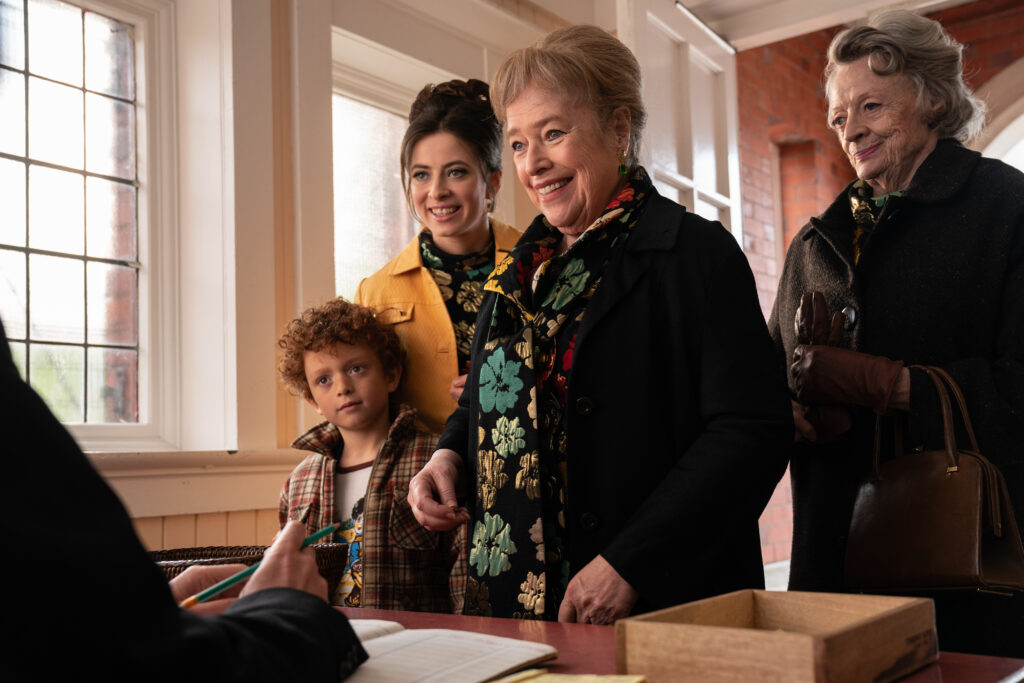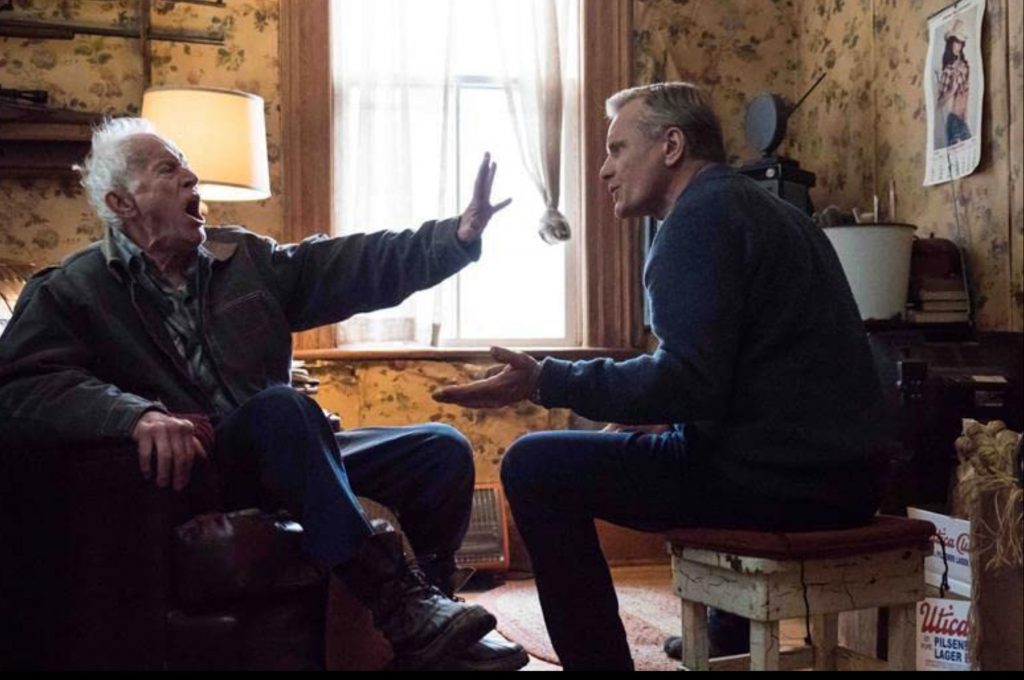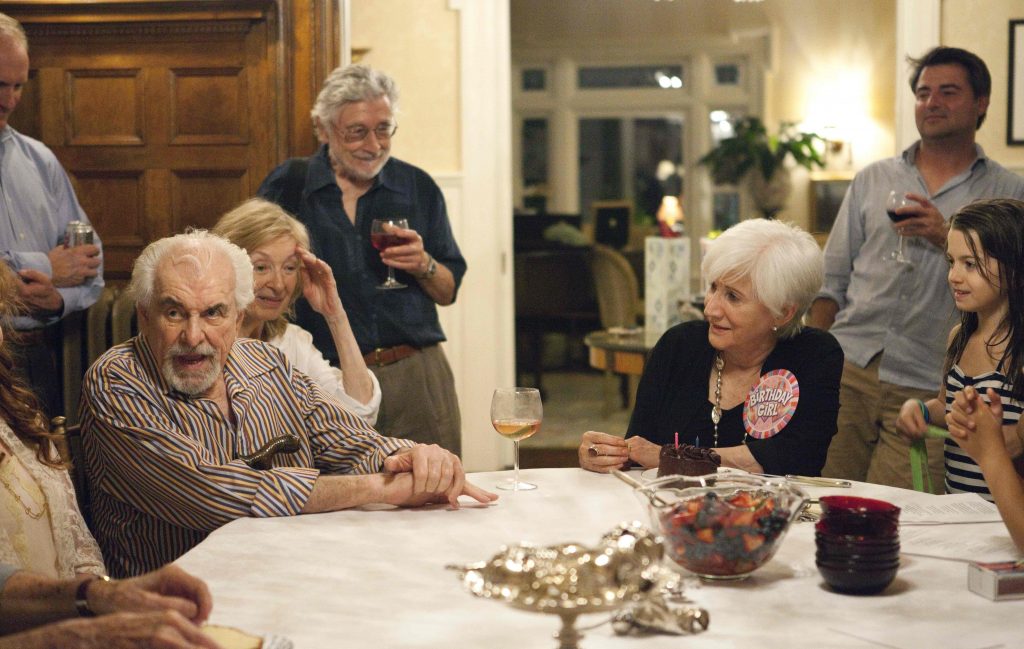July 9, 2023
by Carla Hay

Directed by Thaddeus O’Sullivan
Culture Representation: Taking place in 1967, in Ireland and in France, the dramatic film “The Miracle Club” features an all-white cast of characters representing the working-class and middle-class.
Culture Clash: Four women, who are from a working-class suburb of Dublin, travel to Lourdes, France, in search of personal miracles in their lives, but the trip becomes more about confronting their grief and resentments.
Culture Audience: “The Miracle Club” will appeal primarily to people who are fans of the star headliners and are interested in watching somewhat sentimental European dramas about different generations of women.

“The Miracle Club” offers no real surprises in this retro drama about four women who travel together to Lourdes, France, and confront their pasts. The lead actresses’ performances, especially from Laura Linney and Kathy Bates, are worth watching. “The Miracle Club” is the type of drama that’s a dying breed, simply because it takes a very traditional/old-fashioned approach to telling this story cinematically. There’s an audience for this type of movie, but it’s the type of audience that prefers movies that were made in the 20th century.
Directed by Thaddeus O’Sullivan, “The Miracle Club” had its world premiere at the 2023 Tribeca Festival. Even though the movie’s story is centered on four women, “The Miracle Club” has an all-male team of writers: Joshua D. Maurer, Timothy Prager and Jimmy Smallhorne wrote “The Miracle Club” screenplay. When a movie about women is written and directed by men, the movie sometimes has a very patriarchal tone. There’s a whiff of that patriarchal tone in “The Miracle Club,” but the heart of the movie is how the women interact with each other without influence from husbands or clergymen.
“The Miracle Club,” which is set in 1967, opens in Ballygar, Ireland, a working-class suburb of Dublin. A senior citizen named Lily Fox (played by Maggie Smith) is looking mournfully at a cliffside memorial plaque dedicated to her son Declan Fox, who drowned at sea in 1927, when he was 19 years old. Declan was the only child of Lily and her husband Tommy Fox (played by Niall Buggy), who is now retired.
Declan’s death has left a void that Lily and Tommy don’t like to talk about. Lily has a cranky and very judgmental personality that is outmatched by Tommy’s cranky and judgmental personality. When Lily comes back from visiting the memorial dedicated to Declan, she gets this scolding from Tommy: “You’re not visiting our son. You’re visiting a pile of rocks and sand that don’t mean anything.”
Lily is in an amateur singing trio with two friends who live nearby and who all know each other from going to the same church: Eileen Dunne and Dolly Hennessy. (They are all devout Catholics.)
Eileen (played by Bates) is a middle-aged married mother of six children. Eileen’s oldest child is inquisitive Cathy Dunne (played by Hazel Doupe), who’s about 15 or 16 years old. Eileen’s husband is Frank Dunne (played by Stephen Rea), who likes to think he’s the head of the household, but outspoken Eileen is really the one who runs things in this crowded home.
Dolly (played by Agnes O’Casey, in her feature-film debut) is sweet-natured and in her 20s. She’s also a married mother. Her husband George Hennessy (played by Mark McKenna) is very bossy and impatient. Dolly and George have two children together: Their son Daniel Hennessy (played by Eric Smith) is about 5 or 6 years old, and he happens to be mute. Their daughter Rosie Hennessy (played by Alice Heneghan) is an infant.
George gets annoyed when Dolly asks him to donate some of their money to the church. The family is on a tight budget. Dolly and George’s marriage is also under some strain, because George has become disappointed and frustrated that Daniel is mute. Dolly is hopeful that Daniel will eventually begin talking, which she thinks can happen with the right amount of prayers and encouragement. George, who has grown cynical and bitter about Daniel’s muteness, doesn’t think religion will have anything to do with getting Daniel to talk.
Lily had a longtime best friend named Maureen. Their dream was to take a trip to Lourdes, France. It’s a city whose main claim to fame is the Grotto of Massabielle (also known as the Grotto of the Apparitions), which has a reputation for being a place where miracles happen, ever since the Virgin Mary reportedly appeared to a local woman in 1858. Unfortunately, Lily and widow Maureen won’t be going to Lourdes together because Maureen has recently died.
In Ballygar in 1967, Maureen was on the church’s committee for an upcoming fundraiser: a local talent contest where the winner gets a trip to Lourdes. It’s been decided that the fundraiser will go on in Maureen’s honor. (Brenda Fricker has the voice of Maureen when one of Maureen’s letters is read on screen after Maureen’s death.) Lily, Eileen and Dolly choose to become a “legitimate” singing group and enter the contest. They name their group the Miracles.
Even though all of their husbands think that the Miracles have little to no chance of winning, viewers already know from what’s revealed in “The Miracle Club” trailers that Lily, Eileen and Dolly end up going to Lourdes anyway, with Daniel also along for the journey. (This review won’t reveal whether or not they won the contest.) It’s a bittersweet trip, since they all wanted Maureen to go on this trip too. It will be the first time that Lily, Eileen and Dolly will travel outside of Ireland.
There’s someone else who’s going on the trip with them to Lourdes: Maureen’s estranged daughter Chrissie Ahearn (played by Laura Linney), a middle-aged bachelorette who has been living in the United States and hasn’t been back in Ballygar since 1927, the year that Chrissie moved away as an outcast. Chrissie has reluctantly come back to Ballygar for Maureen’s funeral.
The only person in town who seems to welcome Chrissie is Father Dermot Byrne (played by Mark O’Halloran), who is the chief priest at the local church and the officiator at Maureen’s funeral. Lily and Eileen react to Chrissie’s hometown visit with a lot of hostility toward Chrissie, because of something that happened in 1927. Dolly, who wasn’t even born when this grudge happened, tries to stay neutral, but Lily and Eileen tell Dolly to stay away from Chrissie. Father Dermot takes on the role of peacemaker and suggests to Chrissie that she go on the trip to Lourdes, not just as a tribute to her mother but also to possibly heal old emotional wounds with Lily and Eileen.
Eileen, Chrissie and Declan used to be the best of friends. But something caused a rift in this friendship that led to Chrissie abruptly moving away and cutting off contact with almost everyone she knew in Ireland. Eileen felt abandoned by Chrissie and hasn’t forgiven her.
As already revealed in the trailers for “The Miracle Club,” Chrissie tells Eileen that Chrissie didn’t abandon anyone but Chrissie was “banished.” Chrissie’s “secret” is very easy to figure out before it’s revealed. It’s the most obvious reason why a teenage girl would be sent away from her home in 1920s Ireland.
That’s not the only secret being kept before there’s the inevitable confession to the rest of the group. Lily wants to go to Lourdes for miracle help with her grief over Declan. Dolly wants her miracle to be for her son Daniel to talk. Eileen wants a miracle that has to do with a secret that Eileen is keeping. Eileen’s big secret is also not very surprising.
“The Miracle Club” goes through the expected scenes of discomfort as unwelcome travel companion Chrissie has awkward and tension-filled interactions with Lily and Eileen. It should come as no surprise when Chrissie has to share a hotel room with Lily, who has the most unresolved issues with Chrissie. It’s explained that the hotel is booked up, so there’s no other room available. It’s a very contrived scenario for a movie, because Chrissie could have stayed at another hotel.
“The Miracle Club” doesn’t really waste time, but it doesn’t have any genuine suspense about Chrissie’s secret, which is the main source of the conflict between Chrissie and Lily. Eileen doesn’t find out this secret until much later. The banter between the women is often realistic, but the scenarios around them sometimes look too phony.
“The Miracle Club” pokes fun at male egos by showing how the husbands of Lily, Eileen and Dolly have trouble coping with household duties while their wives are away. Suddenly, these “macho” men find out that they’re kind of helpless and ignorant about a lot of things that they thought were easy to do, just they because they’re thought of as “women’s responsibilities.” It’s the movie’s obvious way of showing that spouses shouldn’t take each other for granted.
The issue of Daniel’s muteness is handled with sensitivity, but it often takes a back seat to the main story about the feuding between Chrissie, Lily and Eileen. Chrissie is the only one of the four women who isn’t religious. She’s grown disillusioned about religion because she thinks religious people are very hypocritical. (Her disillusionment is another big clue about her secret.)
Linney and Bates, as estranged friends Chrissie and Eileen, have the most realistic dynamics in the movie and give the best performances. Smith is doing yet another “grumpy old woman” role that she seems to be stuck doing in the later stages of her career, although the character of Lily has some emotionally impactful scenes toward the end of the film.
O’Casey makes an impressive feature-film debut as Dolly, who is somewhat of “third wheel” to Lily and Eileen. At times, it’s not quite convincing that Dolly could be close friends with Lily and Eileen, because Dolly seems more like a sidekick than someone whom Lily and Eileen treat as an equal. O’Casey brings some very good nuance to this role portraying a mother who tries to be cheerful to everyone on the outside but is worried sick about her mute son.
“The Miracle Club” is not the type of movie where people should expect outrageous things to happen. There’s also no supernatural element to the story, even though much of it takes place in “miracle destination” Lourdes. The Miracle Club” has solid performances and a story that’s the equivalent of familiar comfort food. It’s not going to change the world, but it can be entertaining to people who like this type movie.
Sony Pictures Classics will release “The Miracle Club” in U.S. cinemas on July 14, 2023.








